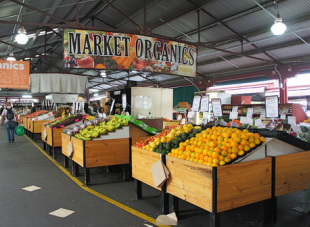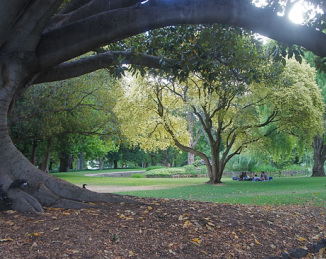
If free markets beat communism, then what we needed for the future was...more free markets. Bolstered by presidents who believed in trickle down economics, economists who believed in rational selfishness, and businessmen whose personal interests aligned with a deification of Ayn Rand and a misunderstanding of Adam Smith, American politics - fueled by self-interested and self-righteous money - embarked on long process of deregulation and lower taxes. All in the name of...The Market. The invisible hands of the marketplace would lead us all to more motivation, more progress, more wealth, and more pursuits of happiness. Or so we were told. Flash forward 20 years, and what have we gotten?
Setting aside the issues of global warming, overfishing, soil erosion, super weeds, oil spills, industrial explosions, biodiversity loss, and a host of other dangerous planetary boundaries and commons that we are despoiling, how has the economy itself done? How are we being served by a slavish devotion to The Market?
Since the election of Ronald Regan in 1980, the share of national income that the richest 1 percent bring home has gone from 8.5 percent to 24 percent (nearly tripling) while the bottom 50 percent of Americans have seen their share drop from 18 percent to just 12.5 percent (a 30% loss). That's the current story for income inequality. For wealth inequality - the accumulated affect of these income disparities - the story is much worse. In the United States, the top 1% has 40% of the wealth, while the bottom 80% has just 7% of the wealth. See these facts (fact checked by the Washington Post) portrayed visually in the astounding 6 minute video below.

In November 2010, IMF economists Michael Kumhof and Romain Ranciere published a paper pointing out that the economic crises of 2007-08 and 1929 were caused by the same phenomenon: radical income inequality. In their paper, Kumhof and Ranciere demonstrated that inequality and financial leverage create an unholy and fatal feedback loop. As the wealthy accumulate ever more money they generate price bubbles in real estate and other assets, which force all participants in the economy to borrow more just to keep up. As the wealthy accumuate capital, their need to find returns for these assets grows. The rich come to financialize their assets in the form of loans to - whom else? - the poor and middle class. Easy credit is the natural result of enormous pools of money seeking returns. As the poor and middle class borrow more in order to maintain lifestyles increasingly beyond their means, unsustainable leverage follows. In both 1929 and 2008, collapse was the inevitable consequence.
How did we get here? Here are three more great quotes from The Gardens of Democracy that really help illuminate what happened, why, and how we should be thinking about that.
Traditionalists assert, in essence, that income inequality is the result of the rich being smarter and harder working than the poor. This justifies government neglect in the face of inequality. The markets-as-garden view would not deny smarts and diligence are unequally distributed. But in their view, income inequality has much more to do with the nature of complex adaptive systems like markets, which result in self-reinforcing concentrations of advantage and disadvantage. This necessitates government action to counter the unfairness and other counterproductive effects of concentration.
The agenda (of trickle down economics) - as exemplified by the Reagan rewrite of the tax code and the Bush perpetuation of it - is itself government-mandated redistribution of wealth: to the already wealthy. The "state of nature" does not dictate preferential treatment of capital over work, or regressivity of taxation, or the tax-free inheritance of unearned wealth and power: these are all consequences of man-made rules. The question, then, is not whether redistribution, but in which direction.
When we tax what Teddy Roosevelt called the "swollen fortunes" of a tiny few - vast fortunes made possible by the investments in public goods by prior generations - and recirculate that wealth in public goods like schools and health care so that the middle and bottom can participate in the economy - we are doing something good for the many and, in the long run, for the few.
This is not socialism in the derogatory sense espoused by believers in The Market who are still afraid of the specter of communism that haunted their youth. This is a a new understanding of the market failures that arise in an under-regulated economy. This is an effort to discover the best way to design capitalism to work for the long-term survival of life - the true definition of good. This is what we need to recognize as a voting electorate, if we are going to reshape our society to meet our next existential threats - ourselves. Younger generations get this. They didn't grow up under threat from the Soviet Union. Their threats now come from oil companies, Monsanto, and Wall Street bankers. And groups like Occupy Wall Street are growing increasingly frustrated by the political economic systems' protection of these players. If we do not recognize this in time, we are headed for a collapse of our ecosystem, a revolution from the 99%-ers, or both.
So what can evolution tell us about the economy? Evolution is principally about finding the balance between competition and cooperation in order for an individual and a species to survive. Written large - this is precisely the drama at play between the forces behind free markets and communism and our struggle to find the right balance between them. Evolutionary philosophy, which seeks to understand the world so we can survive and thrive in it, has this to say about our economics:
Economics
The goal of an economic system is to maximize the survival of the species. Its goal is not to maximize profits or consumer benefits.
Advocating free market capitalism for an economic system is advocating for extreme competition. But as competition gets fiercer and fiercer, the time horizon for survival becomes shorter and shorter as too many firms must sacrifice the long term just to stay alive in the short term. Sacrificing the long term threatens the survival of the species.
Advocating communism for an economic system is advocating for extreme cooperation. But without competition, there are no losers and no incentives for winners. Progress grinds to a halt and the species remains stagnant until it is overtaken by events or other species. This is also a threat over the long term.
The perfect economic system is somewhere between these extremes of competition and cooperation. No perfect balance can be known ahead of time and the economy is too complicated to forecast its design with great accuracy. We must set broad and balanced goals for outcomes and adjust market mechanisms by trial and error to reach these goals. Minimize market failures. Protect commons. Price in externalities. Create a long-term bias. Favor sustainability. Protect consumers. Ease the movement of and access to capital and labor. Provide employment or retraining opportunities. Invest in innovation. Keep exposure to debt default low. Favor robustness over fragility. To each according to his or her talent and effort; not according to his or her means or needs. Replace the extremes of capitalism and communism with these sustainable principles of "evism."
Perfect equality is not possible, but extreme inequality is not sustainable in the long-term. Wealth is generated by talent and effort. Extreme wealth is generated by the economic system and the rules that society has evolved over the course of its history. A large portion of extreme wealth is therefore owed to society. Citizens will need to come to an agreement over what are acceptable ratios of wealth inequality. Ten to one? Thirty to one? Two hundred to one? Three thousand to one? Over the vast history of evolution, the ratios of wealth within tribes were significantly less than they are today.
Labor is not the primary means of producing value - the use of technology and knowledge as the means of production are the primary creators of value. Surplus value comes about from capitalist owners having access to technology and knowledge that laborers do not have access to and cannot bargain for. Exploitation comes from this access, which arises after small differences in the rate of material accumulation become amplified through continued investment and inheritance of that material towards ever more expensive means of production. This does not lead to a collapse of profits as Marx forecasted; this leads to a concentration of profits, which can be used to fortify the owners’ access to the means of production, thus entrenching capitalism. What undermines capitalism is not the falling rate of profits, but the rising levels of inequality that foment revolution. This is a threat to the stability of society and the survival of the species. This is why access to the means of production must be shared. This is why employee-owned cooperatives are a more just and sustainable means of organizing corporations and the economy. These cooperatives must compete with one another, thus ensuring their continued investment in progress, but no few individuals capture an unfair portion of the profits to be used for exploitative means. The same principles of checks and balances of power that make government cooperative and tenable must be applied to corporations as well.
So what can evolution tell us about the economy? Plenty. If we want it to help us survive.

